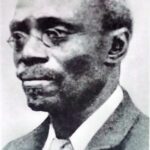SEWA, MANGA
- 3 Min Read
Manga Sewa (who flourished in the 19th century) was a powerful ruler in northern Sierra Leone, with many commercial links with northern peoples both in Sierra Leone and beyond. In the later part of his reign, his country was attacked by Samori Toure’s troops, and he lost his life in the siege of his capital, Falaba.
Sewa was a member of the ruling Samura clan of the Solima state, in the extreme northeast of Sierra Leone. He was born in the early 19th century, the second son of Sori Wuleng (also called Asan Yira), then manga (ruler) of Solimana. Sewa became ruler of Solimana in about 1862. He is credited with the extension, of the areas of influence of Solimana to include numerous small Koranko states in northern Sierra Leone. The Koranko of Barawa, around Kabala, southeast of Falaba, and other Koranko as far as Deldugu (part of present Neya chiefdom) paid tribute to Falaba under Sewa.
It was also during his rule that the separation of the government of the town of Falaba from that of the state took place. Sewa maintained commercial relations with Futa Jallon, to the far north, in what is now the Republic of Guinea, with Sankaran country, and with the Biriwa Limba, under Almamy Suluku . In 1869 Sewa was visited at Falaba by a British explorer and author, Winwood Reade, seeking the source of the Niger. Sewa received him with friendliness, but would not permit him to continue his search. A decade later two French explorers, J. Sweifel and M. Mustier, arrived in search of new openings for trade. He was described by all three Europeans as one of the greatest kings in the hinterland.
Sewa died in September 1884, as the result of the expansionist campaigns of Samori Toure, the Mandinka conqueror. As Samori’s armies moved southwards towards Falaba, the Sofa general Na Ali sent Sayo of Kaliere (formerly part of the Solima state) to demand Falaba’s submission. Unfortunately for Sewa, Sayo saw this as an opportunity to revenge himself for an act of treachery towards his father Isa, perpetrated by the people of Falaba.
When Sayo reached Falaba, Sewa called his council together to discuss whether to submit to the Sofa or not. The council agreed on submission, and Sewa sent Sayo with this message to Nfa Ali Sayo, however, having left Falaba, took red kola-nuts, signifying war, tied them up in a cloth, and presented them to Nfa Ali with the message that Sewa had chosen to fight. The fate of Falaba was sealed by Sayo’s trick.
The Sofa surrounded the town and launched an abortive attack, after which they settled down for a siege. After some six months, the people inside Falaba were reduced to eating rats and the soles of shoes. Sewa sent his son and general, Duga, to seek help. Whereas messengers of war were not usually taken prisoner, Duga was captured by the Sofa, who allowed him to send a message to his beleaguered capital, and then killed him.
After this incident, Sewa decided to give in to the Sofa. But his son Sewa Say insulted him, calling him a coward, which so grieved Sewa that he decided to commit suicide. He called on all those who would die rather than have a Muslim Sofa lay a finger on them to join him in his armory. There, with his chief wife, and a few elders, he put a lighted torch to the armory, and the whole group was blown to pieces. The Sofa then entered Falaba and took possession of it.
MAGBAILY FYLE



